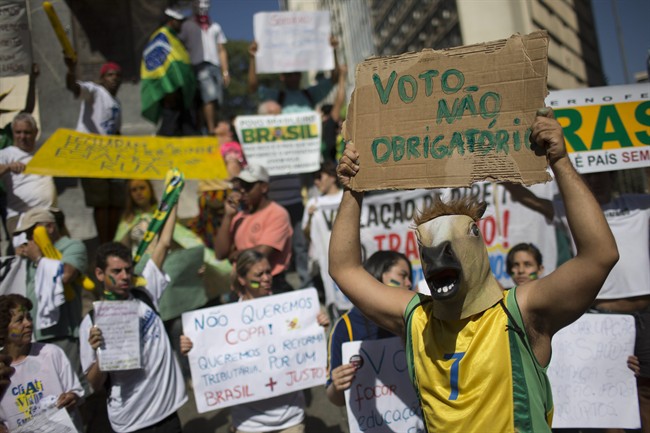The 2014 World Cup is proving not so much a platform for Brazil to showcase itself to the world as a modern, forward-looking society, but rather for its people to air their vast list of grievances.

This week, the country’s federal government relented to the national police force’s demand for a pay increase of 12 per cent.
The trade union representing federal officers, called Fenapef, welcomed the last-minute deal and suspended planned strike actions scheduled for “before, during and after the Cup and before the election,” which is scheduled for early October.
Municipal teachers in Rio de Janeiro, meanwhile, continue to strike over pay inequity while billions have been spent by the Brazilian government to host the global soccer tournament.
Public transit systems across Sao Paulo, the country’s other principle city hosting the event, were also brought to halt Thursday as transit workers went on strike.
‘There will be no Cup’
Hundreds of teachers took to the Rio streets this week protesting under the slogan “Não vai ter Copa”, or “There will be no Cup” — something that’s become a national call to arms of sorts for various disgruntled groups.
Last year, when Brazil hosted the regional Confederations Cup soccer tournament, more than a million people took to the streets in dozens of Brazilian cities over poor public services, corruption and the high cost of the World Cup.
READ MORE: Complete World Cup coverage
The protests were precipitated by a 10-cent hike in transit fares in São Paulo, the country’s biggest city, to help fund the construction of new stadiums and facilities around the country.
The measure was reversed days later in response to the protests. But reports estimate that $3.6 billion in taxpayer funds have still been spent on the tournament, which is scheduled to get underway June 12.
A recent poll by Datafolha, a media polling institute, suggested less than half (48 per cent) of Brazilians are in favour of their country hosting the tournament, down from 79 percent in 2008.
GALLERY: Protests across Brazil over perceptions of government corruption and overspending on preparations to host the World Cup.
WATCH: The World Cup is set to get underway in just over a week and scenes such as these are exactly what Brazil is looking to avoid.






















Comments